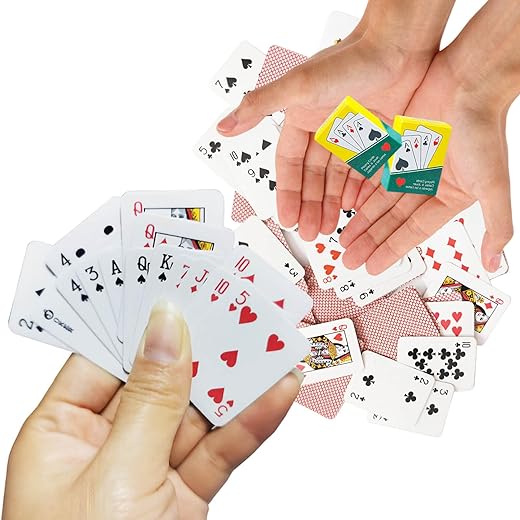
In this step-by-step guide, you’ll learn how to enhance your card skills with mini travel playing cards. Ideal for both experienced players and beginners, these portable cards allow you to practice and improve your skills wherever you are.
Compact Entertainment for On-the-Go Fun!
They’ll Never Discover the Truth
Choose the Right Mini Travel Playing Cards
To choose the right mini travel playing cards, follow these simple steps:
- Determine your preferences: Start by deciding what type of playing cards you prefer – whether it’s a classic design, themed cards, or custom artwork.
- Look for durability: Check the material of the cards to ensure they are sturdy and long-lasting. Opt for cards made of high-quality materials like plastic-coated paper or PVC.
- Consider clear designs: Look for cards with clear and vibrant designs. Avoid cards with small or intricate details that may be difficult to see, especially in low-light conditions.
- Ensure ease of handling: Select cards that are easy to handle and shuffle. Look for a smooth finish and a size that fits comfortably in your hands.
By following these steps, you can choose mini travel playing cards that suit your preferences and provide an enjoyable gaming experience on the go.
Master the Basic Rules
To familiarize yourself with the basic rules of popular card games, follow these steps:
- Choose a card game: Select a popular card game such as poker, blackjack, or solitaire that you would like to learn.
- Research the rules: Look up the rules of the selected card game. You can find them in books, online tutorials, or even mobile apps.
- Understand the fundamentals: Study the basic rules and ensure you comprehend them fully. Take note of the objectives, card values, and any special rules or terms.
- Practice and play: Start playing the card game with friends, family, or online opponents. The more you practice, the better you will understand the game and its nuances.
- Build a strong foundation: Use your knowledge of the basic rules as a foundation to explore more advanced techniques and strategies in the future.
By following these steps, you will successfully familiarize yourself with the basic rules of popular card games and build a solid understanding of the fundamentals.
Practice Card Shuffling
To practice card shuffling effectively, start by mastering different shuffling techniques to achieve a fair and random shuffle. Begin with the riffle shuffle, where you divide the deck into two halves and interlace the cards together. Another technique is the overhand shuffle, where you use your fingers to pull chunks of cards from the top and shuffle them to the bottom. Experiment with other shuffling styles as well, such as the Hindu shuffle or the Faro shuffle, to enhance your card handling skills. Remember, the key is to practice regularly and maintain a consistent rhythm to ensure a thorough mix of the cards.
Develop Card Dealing Skills
To develop your card dealing skills, start by practicing dealing cards to yourself and others. Focus on maintaining a smooth and even flow, ensuring that each card is dealt accurately. Avoid mistakes by staying focused and paying attention to the cards as you deal them. Practice regularly to improve your speed and accuracy.
Master Card Holding Techniques
To expand on the guide titled “Master Card Holding Techniques,” start by experimenting with different ways of holding the cards. Try out various grips until you find one that feels comfortable and allows for easy manipulation and control of the cards during gameplay. This will help enhance your overall card-playing experience and improve your performance.
Learn Card Tricks
Welcome to the world of card tricks! In this guide, you’ll discover a variety of impressive moves that will amaze your friends and family. Not only will you entertain others, but you’ll also enhance your card handling skills. Let’s dive in!
- The One-Handed Cut: Start with a deck of cards in your dominant hand. Hold the deck with your thumb on one side and your middle, ring, and pinky fingers on the other side. Place your index finger on the top of the deck, and use it to push the top half of the deck downwards, allowing cards to slide off one by one. Practice this move slowly at first and gradually increase your speed until you can perform a smooth, one-handed cut.
- The Floating Card: This trick will make it appear as if a card is floating in mid-air. Hold a card between your thumb and index finger, with your thumb on the bottom and finger on top. Gradually release your grip, allowing the card to rest on your other hand’s fingertips while keeping your hand steady. Keep practicing until you can create the illusion of a floating card.
- The Ambitious Card: Start by selecting a card and placing it back into the deck. Using your thumb, control the chosen card to the top of the deck. Tap the top of the deck and say a magic word, then reveal the chosen card from various positions in the deck. The card seemingly keeps returning to the top no matter where it is placed. Mastering this trick requires precision and a bit of misdirection.
Remember, practice is key to mastering these card tricks. Start with simple moves and gradually progress to more complex ones. With time and dedication, you’ll become a card trick expert!
Study Card Counting Strategies
To learn card counting strategies for games like blackjack, start by familiarizing yourself with the basic rules of the game. Then, learn how to assign values to different cards and practice keeping track of them during gameplay. Use online resources or books to understand different card counting techniques, such as the Hi-Lo system or the Knock-Out system. Finally, practice your skills by playing blackjack with friends or in a casino setting. Remember to always play responsibly and within your means.
Practice Card Memorization
To practice card memorization, start by shuffling a deck of cards. Then, challenge yourself to memorize the order of the shuffled deck. This exercise will not only enhance your memory but also improve your cognitive abilities by helping you anticipate upcoming cards. Give it a try and see how your memory skills improve over time!
Participate in Card Game Tournaments
To put your card skills to the test, start by joining local or online card game tournaments. Engaging in competitive play will help you sharpen your skills and gain exposure to different playing styles. To get started, search for upcoming tournaments in your area or on online gaming platforms. Once you’ve found a tournament, register and familiarize yourself with the rules and format. Practice regularly and study different strategies to increase your chances of success. Don’t be afraid to network with other participants and learn from their experiences. Remember, participating in card game tournaments is a fun and exciting way to challenge yourself while improving your gameplay.
- Introduce the Games: Start by selecting a card game that you enjoy and would like to teach others. Gather the necessary materials, such as a deck of cards, and invite your friends or family members to join you.
- Explain the Rules: Begin by explaining the basic rules of the game in a clear and concise manner. Use simple language and avoid overwhelming your learners with too much information at once. Break down the gameplay into smaller steps and provide examples if needed.
- Demonstrate Gameplay: Show a demonstration round of the game to help others visualize how it is played. Walk them through each step, explaining your thought process and decision-making along the way. Encourage questions and offer guidance as they start to grasp the mechanics.
- Encourage Practice and Strategy: After the initial explanation and demonstration, encourage your learners to practice playing the game. Provide tips and strategies to help them improve and develop their own unique approach. Remember to be patient and supportive as they gain confidence and begin to explore new tactics.
By teaching others how to play card games, you not only share the joy of gaming but also reinforce your own understanding of the games. As your learners grow more knowledgeable, they may even inspire you with fresh strategies and perspectives. So, gather your friends, grab a deck of cards, and let the fun and learning begin!
Mastering the Art of Card Games
In conclusion, mastering card skills with mini travel playing cards is within your reach. By diligently following the steps outlined in this guide, practicing regularly, and embracing the joy of exploring new card games, you’ll be amazed at the progress you can make. So, get ready to level up your card skills and have a blast wherever your travels take you!
Essential Supplies
Mastering the Deck
Getting the Most Out of Your Mini Travel Playing Cards
- Shuffle the cards thoroughly before starting any game to ensure a random distribution of cards
- Choose a game that suits your preferences and the number of players. Some popular options for mini travel playing cards include Poker, Rummy, Go Fish, and Solitaire
- Familiarize yourself with the rules of the chosen game. You can find rulebooks or instructions online for most card games, or you can create your own variations if you prefer
- If you’re playing with others, make sure everyone understands the rules and any specific variations you’re using
- Play the game, keeping track of scores or progress as needed. Enjoy the portability and convenience of the mini travel playing cards while having fun with friends or family













Great guide! I’ve mastered the basic rules and practiced card shuffling, but I’m looking for some advanced tips to take my card skills to the next level. Any recommendations?
Thank you for your comment! I’m glad you found the guide helpful. If you’re looking to advance your card skills, I suggest focusing on learning advanced card tricks and studying more complex card counting strategies. These can really elevate your gameplay and make you a more formidable opponent.
I’m having trouble with card dealing. I keep dropping the cards or dealing them unevenly. Any tips on how to improve my card dealing skills?
I understand the difficulties you’re facing. Improving card dealing skills can take some practice. One tip is to hold the deck with your thumb on one side and your other fingers on the opposite side to ensure a firm grip. Also, try to keep your hand steady and practice dealing cards slowly and evenly until you feel more comfortable and confident.
Could you please cover some advanced card memorization techniques in your future articles? I’m really interested in learning more about this topic and how it can be applied to improve card skills.
Thank you for your suggestion! I’ll definitely consider covering advanced card memorization techniques in future articles. Stay tuned for more card-related content!
One tip I found helpful is to practice card shuffling using different techniques. It not only helps in improving your shuffling skills but also adds a flair to your gameplay. So don’t hesitate to try out different shuffling styles!
I recently applied the techniques from this guide during a family game night and it was a huge hit! Everyone was impressed with my improved card skills and it added so much fun to the evening. Thanks for the helpful guide!
I’ve been following this guide for a while now and I can confidently say that my card skills have significantly improved. I even won a local card game tournament recently! Thank you for sharing these valuable tips and techniques.
I’m a beginner in card games and I found this guide extremely helpful in getting started. I would love to see more guides on specific card games and strategies for beginners. Keep up the great work!
Thank you for your feedback! I’m glad you found the guide helpful. I’ll definitely work on creating more guides specifically tailored to beginners and different card games. Your suggestion is much appreciated!
I found this guide really helpful in improving my card skills! The tips and steps were clear and easy to follow. I especially liked the section on card holding techniques as it made a big difference in my gameplay. Thank you for sharing this guide!